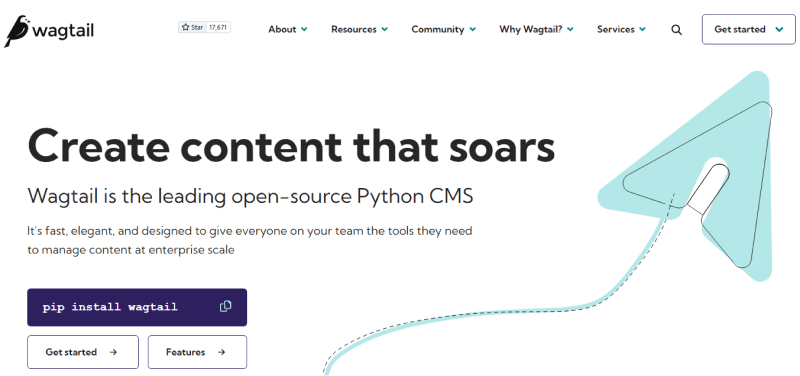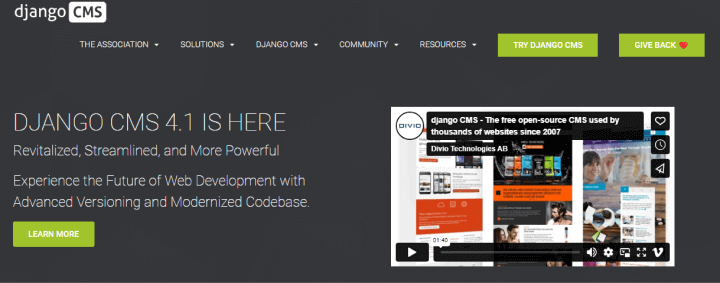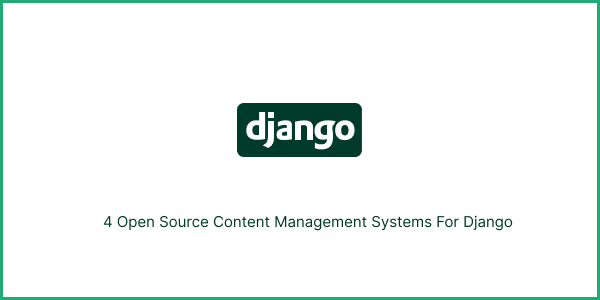Choosing the right content management system (CMS) is crucial for efficiently managing and organizing your website’s content. If you’re a developer using Django, you’re in luck—there are several powerful libraries available that can transform your Django project into a robust CMS. In this post, we’ll explore five excellent Django CMS libraries that you can use to streamline your content management process and enhance your website’s functionality. Whether you’re building a personal blog, a corporate site, or an online store, these libraries offer the flexibility and features you need to create a dynamic and user-friendly website.
Wagtail
Wagtail is an open source content management system built on Django, with a strong community and commercial support. It’s focused on user experience, and offers precise control for designers and developers.

Features
- A fast, attractive interface for authors
- Complete control over front-end design and structure
- Scales to millions of pages and thousands of editors
- Fast out of the box, cache-friendly when you need it
- Content API for ‘headless’ sites with decoupled front-end
- Runs on a Raspberry Pi or a multi-datacenter cloud platform
- StreamField encourages flexible content without compromising structure
- Powerful, integrated search, using Elasticsearch or PostgreSQL
- Excellent support for images and embedded content
- Multi-site and multi-language ready
- Embraces and extends Django
FeinCMS
FeinCMS is a feature-rich content management system for Django, designed to offer flexibility and ease of use for managing website content. It allows developers to build custom content structures and integrates smoothly with Django’s admin interface. Here’s a quick overview of its key features:
- Modular Architecture: Easily extendable with custom modules to fit various project needs.
- Flexible Content Types: Supports multiple content types, including pages, blogs, and multimedia.
- Django Integration: Seamlessly integrates with Django’s admin interface for a familiar user experience.
- Hierarchical Page Management: Allows for the creation of complex page hierarchies and menus.
- Rich Text and Media Management: Provides robust tools for managing rich text and media files.
- Template System: Flexible template system to customize the look and feel of content.
Django CMS
Django CMS is a widely used content management system for Django that focuses on providing a user-friendly and flexible platform for managing website content. It is designed to make content editing and page management straightforward while offering a range of powerful features.

Mezzanine
Mezzanine is a content management system for Django that emphasizes simplicity and extensibility. It provides a streamlined approach to content management with a focus on ease of use and flexibility.
- Simple Admin Interface: Clean and intuitive admin interface for easy content creation and management.
- Hierarchical Page Management: Allows for the creation of hierarchical page structures and custom content types.
- Content Scheduling: Built-in support for scheduling content publication and expiration.
- Search Integration: Includes search functionality with support for indexing and searching site content.
- Rich Text Editing: Integrated rich text editor for creating and formatting content.
- Blog and News: Provides built-in support for creating and managing blog posts and news articles.
- Extensible Framework: Easily extendable with custom content types, plugins, and applications
Saim

Hi there! My name is Saim and I’m excited to dive headfirst into the world of Python Django. I’m eager to learn and grow every step of the way, and I’ll be documenting my journey through blog posts. I’ll share the highs, lows, and everything in between with you. Together, let’s uncover the wonders of Python Django and its endless possibilities in web development.

